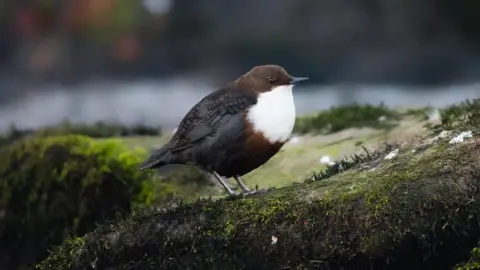Experts hope bird survey will reveal river health
 Pixabay
PixabayA research project looking into declining dipper bird populations could provide a valuable insight into the health of the River Frome.
Locals have been invited to help with the Stroud Valleys Dipper Project by monitoring the species, which is highly sensitive to changes in water acidity and pollution.
The University of Gloucestershire said the nature of the birds made them an important bio-monitoring species for freshwater habitats.
Senior lecturer in practical ecology at the university, Dr Mark O'Connell, said he wanted to find out if developments along the River Frome were going to "damage biodiversity".
"The River Frome and its tributaries are more than 56 miles (90km) in length and there is a lot of development in the catchment," he said.
"We need to know if that change is going to damage biodiversity."
He said the dipper is an "excellent" indicator of river health.
"It is impossible to monitor everything, so instead we use bio-indicators," he explained.
"Dippers feed on water invertebrates, and pollution can affect their populations."
The project is asking volunteers to take part in the survey and add any dipper sightings to a map.
Dr O'Connell said one of the project's aims is to "set a baseline" for dipper populations in the Stroud Valleys so there is "something to measure change against".
 Dr Mark O'Connell
Dr Mark O'ConnellThe International Union for Conservation of Nature has 'Amber Listed' the European dipper due to a 39% decline in the UK since 1995, which means there is cause for concern about the species' conservation status.
But Dr O'Connell said there was hope of reversing the decline, including by slowing down the volume of water that enters the river during rainfall.
"We're taking a complicated environmental situation and coming up with practical solutions," he said.
"We can put the bends back in the river and implement leaky dams, which slow down the river.
"Changes also need to be made to agricultural practices, making them less intense so that there are fewer pesticides and less fertiliser being used, resulting in less pollution in rivers."
Follow BBC Gloucestershire on Facebook, X and Instagram. Send your story ideas to us on email or via WhatsApp on 0800 313 4630.
